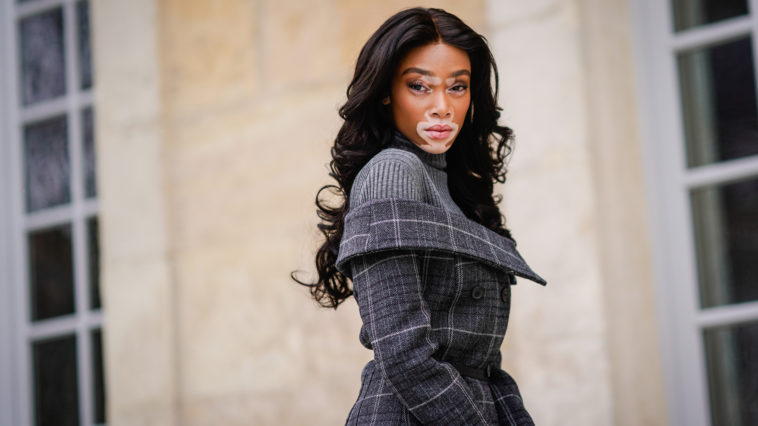“I’m not a ‘Vitiligo Sufferer’. I am Winnie. And, I happen to have Vitiligo, Stop putting these titles on me or anyone else.”, 23 years old Canadian model, Winnie Harlow, recently took to Instagram to skillfully clap back at The Evening Standard, which called her a “vitiligo sufferer” in a recent issue.
Harlow posted a newspaper clipping on her Instagram account, explaining why she’s offended by the wording. In her own Instagram caption, she lashed out at publications that characterize her by her skin condition. Harlow doesn’t want to be perceived as a “vitiligo sufferer” and wants people to recognize her as a hard-working model.
Featured in Unite For Vitiligo’s Famous Vitiligans – Celebrities with Vitiligo list, Winnie Harlow was diagnosed with vitiligo around the age of four. She first secured fame on the 21st season of America’s Next Top Model. The model made her catwalk debut during London Fashion Week in September 2014. She has also been featured in popular videos like Eminem’s Guts Over Fear and Beyoncé’s Lemonade.
Once the subject of bullying by her classmates at school, she now feels empowered by her skin condition and insists on making clear that she is not “suffering” with it. Though vitiligo can sometimes have a big impact on an individual’s mental and emotional wellbeing, it’s not life-threatening or physically painful. And, that’s why Winnie Harlow has taken issue with tabloids for calling her a ‘Sufferer’.
This is an important step in Unite For Vitiligo’s mission to debunk the stigmas around vitiligo. You may have been bullied or alienated as a child, but now as an adult vitiligo crusader, you need to go ‘Winnie way’ – asking people to stop calling you a suffer or victim. Let’s understand why:
-
- Just because you have a certain skin condition doesn’t mean you’re “suffering” from it. The condition cannot define who you are or how you want to live your life.
- Though vitiligo may not hold you back, but it makes you unique.
- Fighting against societal standards of beauty is not something you can “suffer” from.
- Just because you have vitiligo doesn’t put pressure on you to tell everyone you have vitiligo.
- If you make it clear that you are not a sufferer, people choose their words carefully in the future.
Also read: Amy Deanna becomes CoverGirl’s first model with vitiligo. 5 Key Takeaways

